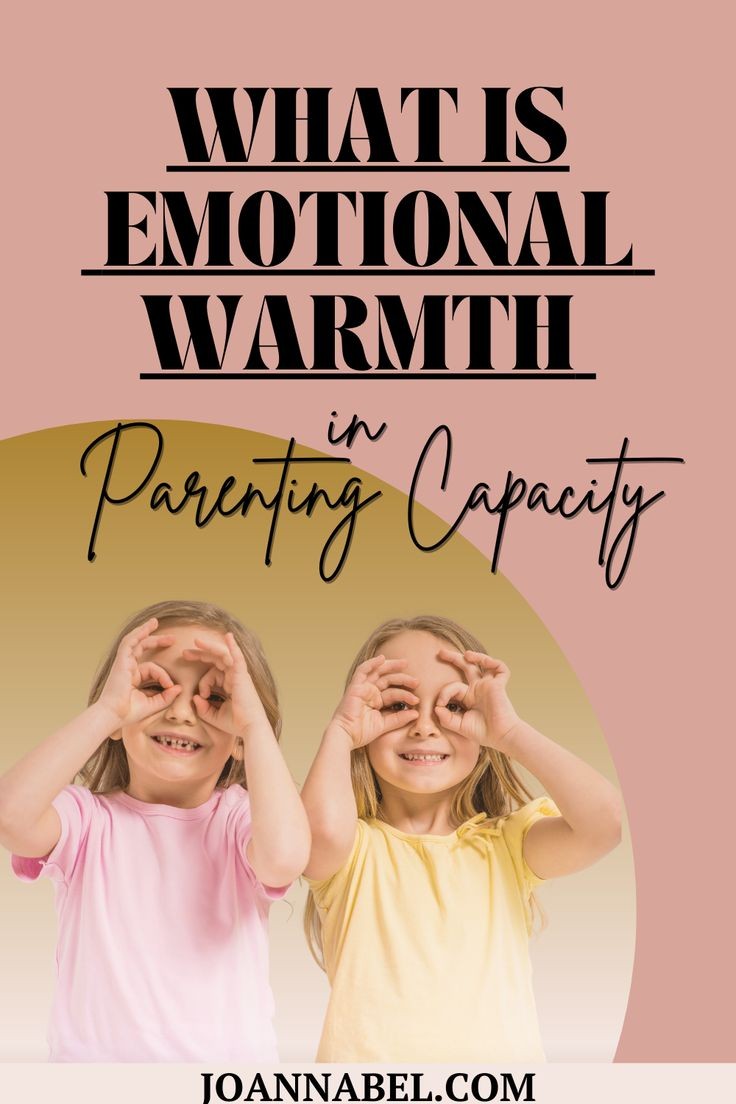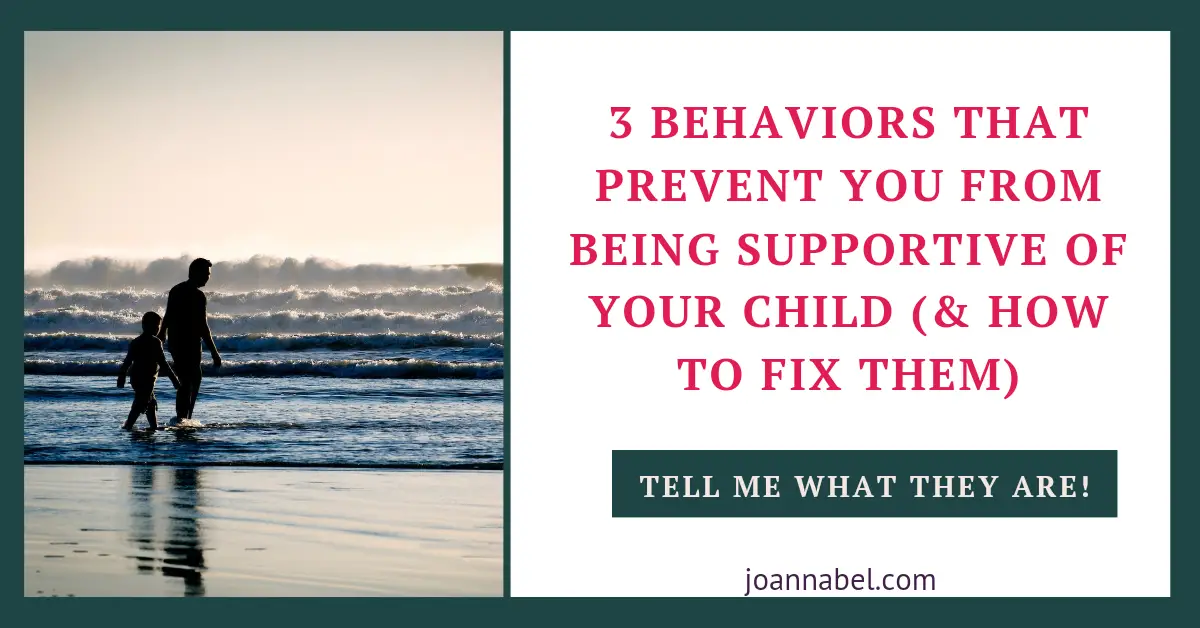If as a parent you’re curious about emotional warmth, you’ve hit the right page! We’re going to talk about what is emotional warmth and responsiveness as a dimension of parenting capacity. But also about how to make sure you approach it the best way.

On top of this, we’ll mention children’s emotional needs you should acknowledge. As well as how you can evaluate your emotional warmth and responsiveness to their needs.
Before we begin, let’s mention what is emotional warmth in the context of parenting capacity in the first place.
Emotional warmth means securing your child senses they’re being valued, respected, and loved as a person and for who they are, have a positive image of their cultural identity, and that they can rely on stable and supportive relationships with their parents and other important persons in their life that consist of positive affection because they’re responsive to the child’s emotional needs.
Now we can start exploring it more thoroughly. But first, we need to mention parenting capacity for those who are unsure what it is.
And for those of you who already know what it’s about, I encourage you to skip that part.
Note: Although I am a Clinical Social Worker, engaging with this website does not establish a professional social worker-client relationship. The information provided here is for general purposes only and should not be considered professional advice. While we strive to ensure accuracy and reliability, this content is not a substitute for professional guidance. For specific concerns, issues, or situations, it is essential to consult a qualified professional and present your situation. Read the full Disclaimer here.
HOW WE DEFINE PARENTING CAPACITY
Parenting capacity refers to parents’ capability to recognize the child’s needs, give them a priority, and respond to them suitably so they can provide protection, care, and necessary conditions for a child to grow and develop.
These necessary conditions need to fit the child’s age. This means they need to be adapted to the child’s developmental needs and evolving capacities. And have to match the phase in the child’s development.
To know more about how or how well parents respond to the child’s needs, we need to undertake a parenting capacity assessment. And parenting capacity has several dimensions. They are:
- ensuring safety,
- basic care,
- emotional warmth and responsiveness,
- guidance and boundaries,
- stability, and
- stimulation.
To be able to become clear about the parenting capacity of a parent, we need to put effort into understanding more about these 6 dimensions with each parent.
For more details concerning parenting capacity, read my blog post that covers it in much more detail. Here is the link: What Is Parenting Capacity And How To Find Balance As A Parent?.
WHAT PARENTING CAPACITY IS NOT
Parenting capacity IS NOT:
- static or inflexible,
- to be reduced just to some psychological factors of parenting,
- just about psychological processes,
- necessarily reflected in the child-parent relationship,
- determined by the child-parent interaction,
- to be seen as the individual skills and capacities of a parent that are fixed or even innate.
If you’re under these impressions, that’s likely due to common misconceptions about individual characteristics being all that influence one’s well-being. And it can happen that you’re not (fully) aware of these beliefs.
That’s depending on the conditions and circumstances a family encounters in the family life cycle.
This means there is a constant exchange between the family and the social environment. A family is a part of society, whose values and culture are reflected in the family.
Individual characteristics of a parent and of a child matter a lot, but there’s much more to it than psychological traits, psychological processes, and individual attributes.
What I also need to say here is that the criteria for good parenting capacity, or good parenting in general, are not to be defined by our personal values and aspirations. Since we all have so many of them.
This means we shouldn’t confuse good parenting with our personal beliefs, aspirations, and (sometimes/often too high) criteria.
Again, much more about parenting capacity and the 6 dimensions of parenting capacity, you can read in my blog post that covers that in detail. Here is the link to access it: What Is Parenting Capacity And How To Find Balance As A Parent?.
Next, we need to mention factors that affect parenting capacity. Because this creates a lot of confusion and there are many misconceptions concerning this.
LIVE Q&A And Consultations with Jovana (WISHLIST)
Want a chance to get included in live weekly calls with me and get access to my expert insights, advice, recommendations, and guidance for your unique situation?
Consider signing up if you are aiming for:
- achieving tremendous child-parent relationships with the least effort possible as you learn what to focus your attention to
- attuning to healthy child development practices without losing yourself in the process and ignoring your human needs, rights, and aspirations for your life
- understanding and responding to your and your child’s needs better and carefully easing the tension between the two
- having your most pressing questions and concerns addressed and ongoing support
- getting skilled in honoring the child’s best interest in each life situation with the help of a few key rules and principles (child wellbeing, independence, autonomy, participation, and equality)
- experiencing a supportive and cooperative relationship with the other parent or a co-parent even in high-conflict circumstances
Address your doubts, concerns, and challenges, but also reflect on your situation through the experiences of others in this small and supportive community.
You’ll unlock monthly access for 60% off of my current hourly rate!
WHAT FACTORS AFFECT PARENTING CAPACITY?
Factors that affect parenting capacity are circumstances that can potentially obstruct parenting capacity or parenting competence. Their existence in family dynamics creates confusion and fear in terms of outcomes on the child’s functioning.
They are physical disability, mental illness of a parent, intellectual disability, psychoactive substance abuse, criminal behavior or lifestyle, violence between intimate partners (domestic violence), family conflicts, parent’s trauma, and socioeconomic conditions.
When I say they have the potential to limit parenting capacity, this means that children can be at risk, and even have their well-being or life endangered.
Still, the fact is that children living in families impacted by these circumstances aren’t necessarily at risk of long-term negative outcomes. And we need to be very attentive to common stereotypical perspectives and prejudices about these families and those kids.
The right way is to more than anything focus on strengths. To observe things from the perspective of strengths. Or we’ll contribute to these families facing (more) stigma and even marginalization. So it’s not about having a problem or a condition, it’s about if and how this influences competence.
And if it does in some way, we put effort to understand what parts of capacity we’ve got preserved, what are factors of protection vs. the factor of risks, what are the available support systems or resources, etc. Simply being affected by these circumstances DOES NOT mean we have weakened or limited parenting capacity.
You may want to check out also:
Now, let’s talk about emotional warmth and responsiveness as a parenting capacity dimension.
EMOTIONAL WARMTH AND RESPONSIVENESS AS A DIMENSION OF PARENTING CAPACITY
Emotional warmth and responsiveness means securing a child senses they’re being valued, respected, and loved as a person and for who they are; have a positive image of their cultural identity; and they can rely on stable and supportive relationships with their parents and other important persons in their life that consist of positive affection because they respond to the child’s emotional needs.
Emotional warmth and responsiveness ”addresses” the child’s need for safe, stable, and persistent connections with the close and important adults in their lives, when those adults are sensitive and sensible to the child’s emotional needs. This doesn’t refer just to their parents, but also to other people in their life that surround them and are close to them, for example, their grandparents. Especially, if they’re the ones who also provide care for the kids, besides parents.
When we talk about meeting their emotional needs, this is about the need:
- for closeness and emotional warmth
- for connection
- to be seen, acknowledged as worthy, and treated as equals
- for appreciation and visibility
- to be respected
- to be empowered and encouraged
- to be heard and understood
- to be reassured and comforted
- for having dependable, trustworthy, and reliable adults in their direct social environment
- to feel loved
- to be certain they have a responsible and competent parent
- to certain their emotional needs will be met
- to be guided and praised
- to feel respected, and worthy in situations when their identity intersects with age and maturity, race, religion, sexuality, disability, etc.
- physical touch they’re comfortable with
- verbal and non-verbal communication determined by an appreciation
- to be educated on respectful interpersonal interaction and treatment (physical and verbal)
- for predictable and stable structure, routines, and environment
- for (positive) discipline, limitations, and a good model for prosocial behavior to adapt
- to become more and more independent
- to have different opportunities to learn and gain new skills and life experiences
- for play and exploring their environment.
The list seems long, but the truth is that many of them are prerequisites for each other, complement each other, or directly influence one another. So this is more about the few groups of needs you need to address.
Good enough responsiveness assumes quick enough, well-timed, consistent, suitable actions and activities directed and targeted to answer to the child’s needs.
Let’s mention how you can determine the level of emotional warmth and responsiveness.
INDICATORS OF EMOTIONAL WARMTH
When it comes to putting emotional responsiveness and warmth in perspective, you can use the next 4 indicators (adaptation based on Bentovim, et al, 2009):
1. How much consistency you show in your emotional responsiveness as a result of the recognition of the child’s emotions
2. How you evaluate and then respond to a child’s emotional tone
3. What kind of tone you use in your communication with the child in general and what atmosphere you’re cultivating
4. How supportive and engaged you are while managing to address the tension between independence and dependence in providing support
If you need these indicators more thoroughly explored with positives and issues pointed out to help you understand, read my post that explores responsive parenting. It’s called What Is Responsive Parenting + 4 Signs Of Emotional Warmth.
And now we should introduce guidelines that can ensure children feel you’re emotionally warm and responsive.
#1 Being receptive to the child’s emotional needs and showing you care
You should be mindful of how important is to express your emotions in a balanced way and support them to show theirs. To hug, touch, and kiss them in a way comfortable for them. And let them do the same.
What’s equally significant is to remember to communicate openly and assertively (not aggressive, nor passive), according to their age and maturity. And at the same time support them to open up to you and ask them what they need. And then really listen.
Direct your actions and communication towards making them feel worthy and respected.
What also plays an important part, is to be sure they feel safe and protected, but without overprotecting them. That’s going to strengthen their independence. This suggests you should inspire and support them to gain more and more independence as they mature.
On top of that, you should show them by your example what it means to be responsible, considering this way they’ll learn the best.
Read:
#2 Self-regulating in managing kids‘ mistakes and misbehavior
Be mindful and correct them with love and teach them how to do things a better way. Avoid intimidating them when they did something wrong. You rather try to explain so they understand the consequences of their actions. That’s because if they are too young for certain explanations, then yelling doesn’t have a point even more.
This doesn’t mean you shouldn’t act naturally. It just means that instead of just being reactive to the behavior, it’s essential to become more conscious and find the right response. In this constellation of things, you need to understand your emotions first and then recognize the child’s need behind the behavior.
Additionally, focus on supporting them in integrating the existence of mistakes in life. Including how to find balance with accepting their and other people’s mistakes.
If you’re using punishments, make sure (with your words and actions) they understand you don’t love them less. And be certain they understand what’s the reason behind the punishment. Always, always avoid corporal punishment because this is an attack on the child’s dignity and bodily integrity. Here is the link to my post to help you use punishment in a safe way.
Be comforting and reassuring, encourage them and motivate them to move forward, and congratulate them when they succeed.
You should check out also:
If you found the information on the blog helpful & inspirational and you feel like giving back, you can do it by clicking the donate button after entering amount you’re comfortable with. I’ll use it to create and deliver more useful content and resources like this. Thanks for your precious contribution!
#3 Being transparent with kids
Find a decent way to tell them the truth so they understand what is happening around them. This obviously doesn’t mean that you should expose them to content that’s inappropriate or harmful. But it does mean that you’ll inform them about important things and decisions that need to be made that will affect and even disrupt their life.
By including them, you’re providing them with a sense of control over the situation and this is essential. Because that way life isn’t just happening to them – they’re managing it and influencing it and aren’t just victims of circumstances.
This also suggests that you avoid hiding the problems from them. Life is full of problems and they will get accustomed to that. And won’t be too fearful of problems or avoid dealing with them.
Instead, you find a way to make them understand or to make them not worry. Because if they don’t understand and they (almost) always feel something is wrong, they will worry and fear even more.
Often times when they don’t understand and you’re hiding the important truth from them, they’ll experience psychosomatic consequences of stress because they don’t feel safe.
Need help concerning these guidelines? I’d be happy to support you. See how we can work together here.
Related:
#4 Encouraging freedom, inclusiveness, and participation
Cultivating the sense of freedom within a family is important because when we don’t feel safe in our homes, it’s really hard to believe others will accept us for who we are if those that know us the best don’t.
Therefore, make them feel loved, respected, and valuable for who they truly are in situations when their identity intersects with age, race, religion, sexuality, disability, etc. And assist them to shape their cultural and other identities.
It’s better not to teach them to fear the world around them too much, and instead teach them what it means to be careful, conscious, and cautious (enough). To read between the lines and don’t trust things that don’t feel completely true to us. And to listen to their intuition.
Considering they’ll learn from your behavior the best, it’s wise to be mindful of your actions and responses. And to be reliable and dependable so they know they will be safe.
Don’t forget to encourage their participation in decision-making and events whenever possible because this is a sign of respect and validation. So show them that their voice matters and that you care about how they feel and what they think about things that surround them.
Everything we’ve covered here doesn’t suggest you can, or have to always excel at everything in every moment. And that you should fear making mistakes. You’ll be also learning along the way mostly. We all do. But what matters is that you learn to differentiate a mistake from a behavioral pattern you should deal with to improve your situation.
What’s important is the fact that if we slip now and then this won’t affect your child-parent relationship. Kids know when their parents are there for them.
Latest Posts:
- The Biggest Benefits Of Adopting A Dog For Your Family (5)

- How To Turn Crafting Into Family Fun Time (6 Ideas)

- Creative Ways To Play With Kids Without Technology

- How To Make Gift-Giving More Special For Kids (4 Ideas)

- How To Do A Prenup Online (What To Expect)

- 5 Strategies To Help You Make More Time For Your Family

FINAL THOUGHTS ON EMOTIONAL WARMTH AS A DIMENSION OF PARENTING CAPACITY
We’ve covered a lot about emotional warmth as a parenting capacity dimension and I sincerely hope that you found it helpful. And that it has given you some direction to where you should go concerning how to think and behave when it comes to the emotional needs of a child.
If you find this post useful, share it with others or on social media, or both! We can raise awareness this way together.
And now to you – what do you see as your strengths in providing emotional warmth? And do you think you’re experiencing certain difficulties in ensuring emotional warmth?










Leave a Reply